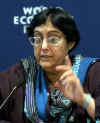|
|
the-south-asian.com February 2003 |
||||
|
FEBRUARY 2003 Contents Music Cello in
Indian
In News South Asian voice at Siblings - achievers
Serialisation
of 'Knock at every alien Events Cricket World Cup Lehngas - a limited collection Books
|
|
||||
|
South Asian Voice at Davos - January 2003 The World Economic Forum met in Davos for six days in January 2003. The core theme of this year's Annual Meeting was 'Building Trust'. Business leaders, political figures, and 'minds-that-matter' discussed issues of Corporate Challenges, Global Economy, Global Governance, Security and Geopolitics, and Trust & Values. The-south-asian takes a look at the South Asian Voice present in Davos. Can't We All Just Get Along? There is no intrinsic reason why people of
different religions should be in conflict with each other, at least on a
religious basis. That was the conclusion of leaders of monotheistic faiths
discussing why believers of different convictions could not get along with
each other. But secular views voiced during the session suggested that
conflict is inevitable as long as there is inequality of access to
resources, and power. All photos courtesy and © www.swiss-image.ch Text courtesy: www.wef.org
Vijay Mahajan, Managing Director, BASIX,
India, said the problem of helping the poor is more intractable. "The
big roadblock is that the poor are short of purchasing power and no amount
of changes in marketing strategy, distribution channels - is going to get
rid of that." He noted that micro-finance is not the panacea for
poverty and the solution is much more complex, sometimes requiring political
and social changes. Most importantly, he added, is the "attitudinal
change among the elite." When Markets Fail, Who Responds? Sanjay Kumar, Chairman, President and Chief Executive Officer, Computer Associates International, USA, a Global Leader for Tomorrow 1999, said that in IT, a comparison of the performance of two teams with equal technical ability will always favour the diverse one. Recognizing and Managing Diversity Dhruv M. Sawhney, Chairman and Managing Director, Triveni Engineering and Industries, India, said that developing countries feel better informed about the Doha Round than they had been in the 1986-93 Uruguay Round "when we didnít know what we were doing...We came out feeling we had been taken for a ride, and that caused mistrust." The WTO has become a big political issue in India. "We need confidence-building very rapidly." The Next Trade Round: What Business Needs
S. M. Krishna, Chief Minister of the Indian
state of Karnataka, the answer is clear. The world needs more globalization
and liberalization, not less, he declared. "Globalization must become a
way of life for all of us." Globalization, Poverty and Inequality However, Jeroo Billimoria, Executive Director, Childline India Foundation, India, and Social Entrepreneur, noted that India was suffering from a crisis of confidence in NGOs because organizations have been set up to provide positions for ex-Ministers or senior officials, others are "briefcase" NGOs without much to show on the ground, and similar problems. "There is a decline in the money coming into the NGO sector," she reported. As a result, her organizations and a number of others had set up a Credibility Alliance to regulate the sector and provide more transparency. NGOs: Responsibilities and Limits of Being Global
|
|||||
| Copyright © 2000 - 2003 [the-south-asian.com]. Intellectual Property. All rights reserved. | |||||
| Home | |||||



